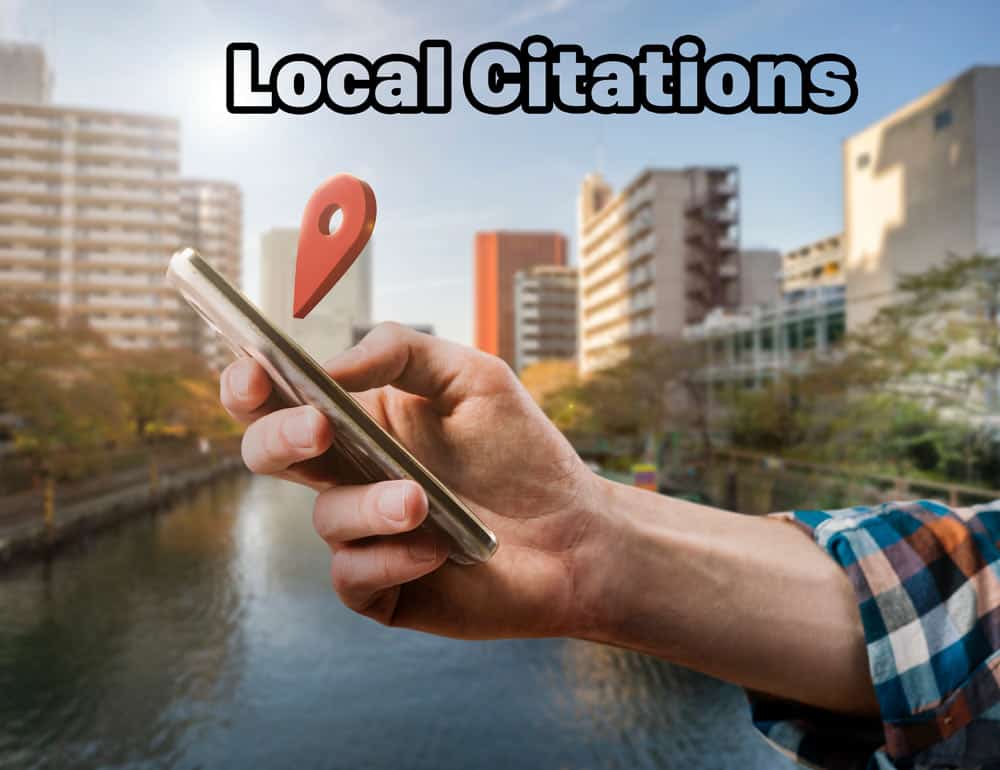Running a local business means competing for attention on multiple fronts—social media posts, flyers around town, community events, and, of course, the all-important local search results.
When people in your neighborhood google phrases like “plumber near me” or “best pizza in [city name],” you want your business to show up front and center.
That’s where local citations come into play. While the term may sound technical, citations are really just online mentions of your business details. Think of them as the digital signposts pointing customers your way.
In this post, we’ll break down exactly what local citations are, why consistent business listings are so vital to your local ranking, and how you can quickly build (or clean up) your citations—even if you’re not a tech guru.
If you own a local business, the information here could be the difference between losing out to competitors or becoming the go-to choice in your community.
What Exactly Are Local Citations?
A local citation is any online mention of a local business’s key information—commonly referred to as NAP: Name, Address, and Phone Number. Sometimes you might also include your website, operating hours, or other details like a business description. These citations can appear on:
- Online directories (e.g., Yelp, Yellow Pages, Apple Maps)
- Social media platforms (e.g., Facebook Business Pages)
- Local chamber of commerce websites
- Industry-specific directories (e.g., TripAdvisor for travel, Zocdoc for medical practices)
Think of citations like breadcrumbs leading potential customers straight to your door. The more breadcrumbs you have scattered on reputable sites—and the more consistent they are—the easier it is for both search engines and consumers to find you.
If you’re a small bakery in Chicago, having a consistent listing on Google Business Profile, Yelp, Facebook, and local food directories ensures you pop up when someone searches for “fresh bread in Chicago.”
Why Do Search Engines Care?
Search engines like Google want to provide the most accurate and relevant results. Part of that accuracy check involves seeing if your business details match up across the internet. When your business shows consistent information—same name, address, phone number, etc.—everywhere, it signals to Google that you’re a reliable, established entity.
On the flip side, if your phone number is different on three different directories or your address is outdated, Google might question whether it should serve your business as a top result.
Why Consistent Listings Are Non-Negotiable
Picture this scenario: You recently moved your boutique clothing store to a larger space three blocks away. Your old address might still be listed on a few websites or directories. A new customer finds you on Google, sees that old address, and heads there—only to discover an empty storefront.
That customer might lose faith in your professionalism, and guess what? Google might also notice the mismatch, potentially hurting your local search visibility.
Consistent Listings Build Trust
From a human perspective, consistent business information builds trust with customers. Think of it like brand consistency: the same logo, the same color scheme, the same tagline, and yes—the same contact details. Inconsistent or outdated info can make you seem disorganized or even out of business.
Search Engines Rely on Signals
For search engines, these listings are data signals that help confirm your business’s legitimacy and location. When your name, address, and phone number line up across multiple high-authority sites, Google sees strong proof that your business is real and relevant. Conversely, inconsistency can create confusion and cause your listing to rank lower.
Customer Experience Matters
Beyond technical details, there’s the real issue of customer experience. A wrong address or phone number leads to frustration, missed appointments, or wasted trips.
With so many competing businesses just a tap away, most people won’t give you a second chance if they’ve had a negative first impression.
The Business Impact of Ignoring Local Citations
You might be thinking, “I have so many hats to wear—accounting, hiring, inventory, marketing—do local citations really deserve my time?” The answer is a resounding yes.
In a world where 80–90% of consumers use online searches to find local businesses, accurate citations can be the difference between a full schedule and a silent phone.
Falling Behind Competitors
If your competitors are actively ensuring their listings are consistent and visible on major directories, guess who’s going to show up higher in local results? Not you. And in local search, being on page two can feel like being invisible.
Loss of Revenue
Imagine 10 or 20 potential customers each month being directed to the wrong phone number or old website link. That’s more than just a missed call—it’s missed revenue.
Over time, those losses can add up, especially if you factor in word-of-mouth that never happens because someone never actually found your store.
Damaged Reputation
We live in a world where convenience often trumps loyalty. One bad experience—like trying to call your business at a number that’s no longer in service—can make a customer turn elsewhere.
If they share that negative experience online, you might end up fighting a reputation battle you never intended to wage.
In short, neglecting local citations can erode consumer trust, undermine your marketing efforts, and hand an easy advantage to your competitors. Fortunately, the steps to fix this are straightforward.
Step-by-Step: Building Your Local Citations
Now for the practical part: how do you build citations in a way that boosts your local search visibility? You don’t need to be a tech whiz. The key is organization, consistency, and a little patience.
Gather Your Business Information
Start by creating a simple document or spreadsheet with:
- Official Business Name (Avoid adding extra keywords here. Use your real, legal business name.)
- Physical Address (or addresses, if you have multiple locations)
- Primary Phone Number (local number preferred over a toll-free one for local SEO purposes)
- Website URL
- Business Categories (e.g., “bakery,” “home remodeling,” “dental clinic”)
- Hours of Operation
- Short Description of Your Business (one or two sentences)
Having everything in one place reduces the chance of typos or conflicting details when you start listing on different sites.
Identify Key Directories
There are many places to list your business, but start with the most significant, high-authority platforms:
- Google Business Profile: This is priority number one for local businesses. It ensures you appear on Google Maps and local search results.
- Yelp: Especially useful for service-oriented businesses and restaurants.
- Facebook: Setting up a Facebook Business Page is an easy citation.
- Apple Maps: Important for iPhone users navigating to your location.
- Bing Places: Although Google dominates, Bing still has a noteworthy user base.
From there, look for industry-specific directories (like TripAdvisor for travel/hospitality or Zocdoc for healthcare) and local community sites (like your chamber of commerce). Listing on these niche platforms can be a big advantage since the audience is pre-qualified—people searching on a restaurant-focused site are obviously interested in dining options.
Create or Claim Your Listing
For each platform, you’ll either create a new listing or claim an existing one. Sometimes your business might already show up because these directories pull from public data. If that’s the case, just follow the verification process to prove you’re the owner. Common verification methods include receiving a postcard or phone call with a unique code.
Input Information Consistently
As you fill out each listing, copy/paste from your spreadsheet to avoid typos. Triple-check that your name, address, and phone number (NAP) match exactly. Small differences—like “Street” vs. “St.”—usually won’t ruin everything, but it’s good to keep it uniform. Where possible, add photos, business hours, and a short description.
Verify and Go Live
Once you’ve added all your details, you often need to verify the listing. On Google Business Profile, for example, they may mail you a postcard with a code to confirm your address. Don’t skip this step; unverified listings might not show up prominently in search results.
Track Your Progress
Keep a record in your spreadsheet of when and where you’ve listed your business. Write down logins, URLs, and verification dates. This not only helps you stay organized but also makes it easier to update details later.
Step-by-Step: Cleaning Up (or “Fixing”) Your Citations
If your business has been around for a while, or if you’ve moved locations, there’s a good chance outdated or incorrect listings are floating around on the web. Cleaning up these old citations is just as vital as building new ones.
Conduct an Audit
Start by searching for your business name and old addresses or phone numbers in quotes (e.g., “Pat’s Pizza Palace” + “123 Old Street”). This helps you find directories you might have forgotten about. Also, look at your analytics tool to see if obscure directories are sending traffic; you can check those websites to confirm they have the right info.
Make a List of Problem Citations
Gather any listing that has incorrect or incomplete data. It might be an old phone number, an outdated address, or a former business name. Even small differences, like missing suite numbers, can create confusion.
Claim or Contact
If the listing is on a platform where you can claim your business, do so and then correct the details. If it’s a site that requires you to submit changes via email or a contact form, do that. Be persistent; some directories take time to update.
Keep a Record
Much like building new citations, keep a spreadsheet or document detailing where you submitted changes and when. Some directories update instantly, while others might take weeks—or they might forget if you don’t follow up.
Re-check and Maintain
After a few weeks, revisit those platforms to ensure your updates went through. Local citations aren’t a one-and-done task; you’ll want to revisit your listings every so often, especially if your business undergoes any changes—like adding a second location or altering your hours.
Making Citations a Priority: The Big Picture for Your Business
Maybe you’re still wondering, “Is all this worth my time?” The short answer is: absolutely. Investing in citations has both short-term and long-term benefits that can directly impact your bottom line.
- Improved Local Rankings: Citations are a key factor in determining who appears in that coveted Local Pack on Google. If you can get your business into those top spots, the exposure to local customers is enormous.
- Better Brand Visibility and Trust: The more places your business appears—and the more consistent those listings—the more authoritative your brand appears. Customers often check multiple sources before calling or visiting, and consistent information builds their confidence.
- Reduced Customer Confusion: By removing outdated phone numbers or addresses, you minimize missed calls, missed visits, and missed opportunities to convert an interested prospect into a sale.
- Competitive Edge: If your competitors have sloppy listings, you stand to gain. People searching for services might see your accurate, up-to-date information and choose you over a competitor that seems disorganized or shady.
5. Foundation for Other Local SEO Efforts: Citations go hand-in-hand with reviews, social media, and your website. When your citations are in good shape, it complements your other marketing efforts, making them more effective and cohesive.
Common Myths and Pitfalls
As you embark on building or cleaning up local citations, watch out for these potential mistakes or misunderstandings:
- Myth #1: “I only need Google Business Profile.”
While Google is critical, limiting yourself to just one platform could mean missing out on an entire group of customers who use Yelp, Apple Maps, or other directories.
- Myth #2: “Citations are a one-time job.”
If any part of your business changes—location, phone number, operating hours—you need to update those details everywhere. It’s an ongoing process.
- Myth #3: “Minor differences don’t matter.”
While “St.” vs. “Street” won’t usually sabotage your ranking, consistently using the same format makes you look more professional and reduces the chance of confusion.
- Myth #4: “I should add extra keywords to my business name.”
Resist the temptation to stuff phrases like “Best Bakery in Town” into your listing’s name. Not only can this confuse customers, but many platforms (including Google) penalize businesses for keyword stuffing.
Wrapping Up: Why Local Citations Deserve Your Immediate Attention
The digital landscape can be overwhelming for small business owners juggling multiple responsibilities. But local citations—being straightforward to implement and deeply impactful—deserve a top spot on your to-do list. Here’s why:
- They’re high-impact for local visibility.
- They’re relatively easy to manage once you have a system.
- They improve the customer experience (no more wrong numbers or addresses).
- They boost trust with both Google and prospective customers.
Think of local citations as the online version of having consistent signage across your shop, your vehicle, and your business cards. When everything aligns, it radiates professionalism and reliability.
When you ignore it, you risk letting potential customers slip away—people who might have become loyal patrons if they’d only been able to find or contact you properly.
So take a few hours, gather your NAP info, and start searching for listing opportunities on major directories. Update old or duplicate listings, and keep a simple spreadsheet as your tracker. Yes, it’s an investment of time, but it’s an investment that has a direct line to your bottom line.
The next time someone needs exactly what you offer, they’ll be able to find you quickly, trust the information they see, and call or visit with confidence.
In today’s competitive local market, that trust—and your visibility—are what keep your doors open, your phone ringing, and your customers satisfied.
Don’t let something as simple and fixable as inconsistent listings hold you back. Make local citations a priority, and watch your business reap the rewards.
If you need help, book a call with us here at Ravecode Solutions! We can help!







